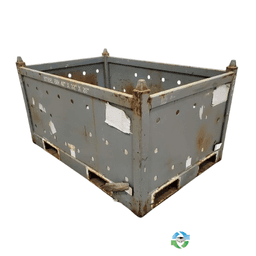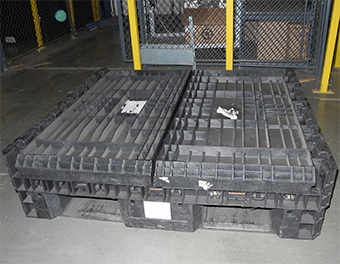Just How Bulk Containers Can Boost Efficiency in Your Product Packaging Procedures
Mass containers play a vital role in enhancing packaging operations. Their design enables better usage of upright space and promotes arranged inventory management. This effectiveness leads to lowered product replenishment regularity and lower labor costs. Additionally, the sturdiness of these containers reduces product damage. As companies seek methods to improve their processes, comprehending the complex benefits of mass containers comes to be important. What various other benefits might they offer the table?
Streamlined Storage Space Solutions
As companies seek to maximize their procedures, streamlined storage remedies have actually become important for improving packaging effectiveness. Efficient storage not only saves area but also facilitates quicker accessibility to materials, which is vital in fast-paced production environments. Mass containers, developed for easy piling and company, substantially minimize the complexity of storage space systems. They enable companies to take full advantage of vertical room while lessening the impact required for supply.
Furthermore, these containers typically feature ergonomic layouts that simplify managing and transportation, reducing the risk of injury and boosting workflow. By consolidating materials wholesale containers, firms can decrease the frequency of restocking and simplify their supply chain processes. In general, the execution of efficient storage space services fosters an extra organized work space, causing increased productivity and lowered functional costs. With thoughtful layout and tactical use of bulk containers, organizations can accomplish significant renovations in their packaging procedures.

Waste Reduction and Sustainability
While the pursuit of performance often drives product packaging choices, waste decrease and sustainability have emerged as important factors to consider in modern-day operations. Business increasingly recognize that adopting bulk containers can greatly lessen material waste. These containers often utilize less product packaging material than traditional techniques, causing a smaller carbon impact.
Bulk containers can be recycled numerous times, which additionally reduces the need for single-use packaging and lowers overall waste entering landfills. Their style typically permits easier recycling procedures, lining up with sustainability goals.
Additionally, firms that focus on waste reduction can enhance their brand name reputation, attracting eco conscious consumers. By implementing bulk containers, companies not only streamline operations but also add positively to environmental stewardship. This twin benefit of functional effectiveness and sustainability placements companies positively in a competitive market increasingly concentrated on environment-friendly practices.
Improved Production Line Performance

Executing bulk containers on production line considerably improves performance by streamlining the handling and transportation of materials. By using mass containers, manufacturers can reduce the regularity of material replenishment, allowing employees to concentrate on setting up tasks instead than constant supply monitoring. This brings about fewer disruptions and a smoother process, ultimately boosting performance.
In addition, bulk containers are made for simple integration with automated systems, even more maximizing the setting up procedure. Their standardized shapes and sizes promote better company, allowing employees to locate and access materials rapidly. This he said decrease in search time contributes to a more fluid manufacturing setting.

Cost Savings and Enhanced Profit Margins
Noteworthy price financial savings can be recognized through the fostering of bulk containers in packaging procedures. By decreasing the need for multiple smaller plans, firms can reduce product costs significantly. Mass containers usually call for much less product packaging material on the whole, resulting in reduced expenses on products. In addition, the performance of bulk handling lessens labor expenses related to packing and unpacking, further boosting savings.
Less trips to suppliers and lowered transportation costs are additionally crucial benefits, as mass containers permit enhanced item ability per shipment. This higher volume not only reduces delivery expenditures but also optimizes storage area within centers, resulting in improved stock monitoring.
The sturdiness of mass containers typically converts to lower damage prices during Check This Out handling and transport, protecting item stability and decreasing waste. Collectively, these elements add to improved revenue margins, making bulk containers a financially beneficial choice for organizations looking for efficiency in their product packaging procedures.
Flexibility Throughout Industries
Bulk containers offer impressive convenience throughout different markets, making them a useful possession beyond simply set you back financial savings. In the food and beverage market, these containers help with the secure transport and storage space of big quantities of components, enhancing efficiency in production lines. In drugs, mass containers ensure conformity with rigid hygiene requirements while accommodating the mass handling of basic materials. The chemical market likewise advantages, as these containers withstand harsh substances and stop contamination, sustaining secure procedures. used collapsible containers. Additionally, the farming market utilizes bulk containers for delivering plant foods and grains, minimizing and enhancing logistics waste. Their flexibility prolongs to production, where mass containers enhance assembly procedures and decrease the requirement for excessive product packaging. This cross-industry capability not just enhances functional performance but additionally promotes sustainability through minimized product packaging waste, highlighting the important role bulk containers play in modern supply chains
Frequently Asked Questions
Exactly How Do Bulk Containers Impact Employee Safety in Packaging Procedures?
Mass containers considerably improve worker security in product packaging procedures by minimizing hands-on handling, minimizing injury risks, and advertising ergonomic practices. Their layout facilitates more secure transport and storage, inevitably developing an extra secure job setting for all workers.
What Products Are Mass Containers Normally Made From?
Bulk containers are commonly made from durable products such as high-density polyethylene, metal, polypropylene, or timber - used collapsible containers. These products provide strength, resistance to ecological elements, and viability for numerous contents, guaranteeing reliable and safe transport of items
Can Bulk Containers Be Custom-made for Particular Products?
Yes, bulk containers can be customized for details items. Makers often tailor dimensions, products, and includes to satisfy one-of-a-kind needs, ensuring suitable protection and efficiency throughout storage space and transportation of various goods.
How Do Bulk Containers Affect Transport Logistics?
Bulk containers improve transportation logistics by making best use of freight room, minimizing the variety of trips needed, and minimizing handling costs (used plastic containers). Their standard measurements help with effective packing and discharging, inevitably leading to hop over to these guys boosted functional effectiveness throughout the supply chain
What Is the Life-span of Mass Containers in Regular Usage?
The life-span of mass containers in regular use typically varies from 5 to ten years, relying on material high quality, managing methods, and ecological problems. Appropriate maintenance can considerably extend their functionality and efficiency.
Implementing bulk containers on assembly lines considerably enhances performance by enhancing the handling and transportation of products. Mass containers often call for much less product packaging material in general, resulting in lower expenditures on supplies. In drugs, mass containers ensure conformity with stringent hygiene standards while suiting the mass handling of raw materials. Their flexibility prolongs to production, where bulk containers streamline setting up procedures and reduce the requirement for excessive packaging. Mass containers considerably boost employee security in packaging procedures by decreasing hand-operated handling, minimizing injury dangers, and advertising ergonomic methods.